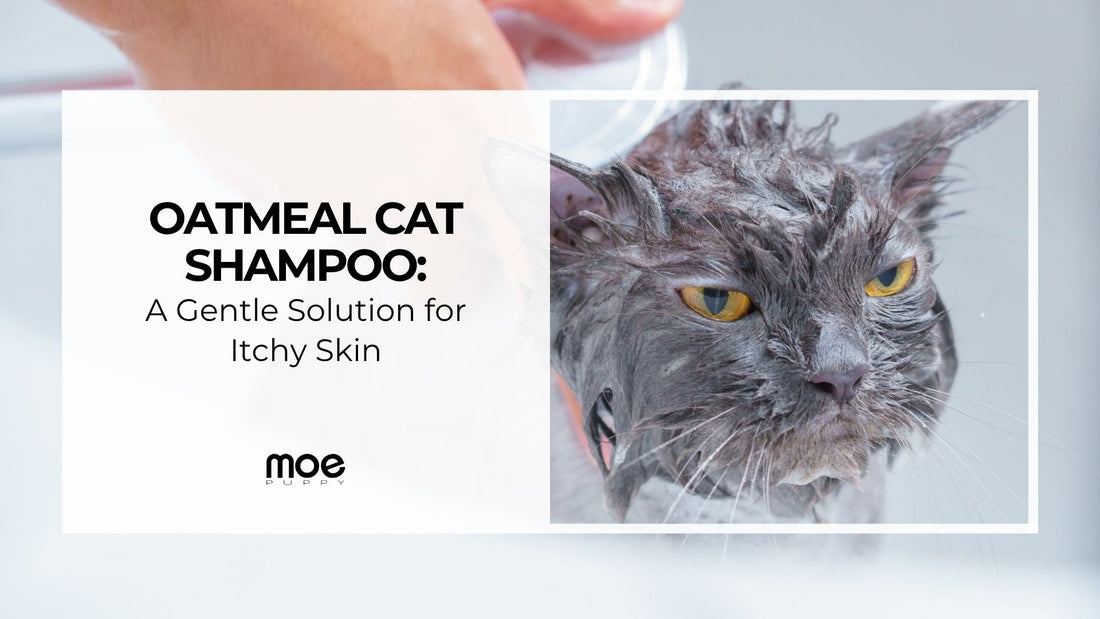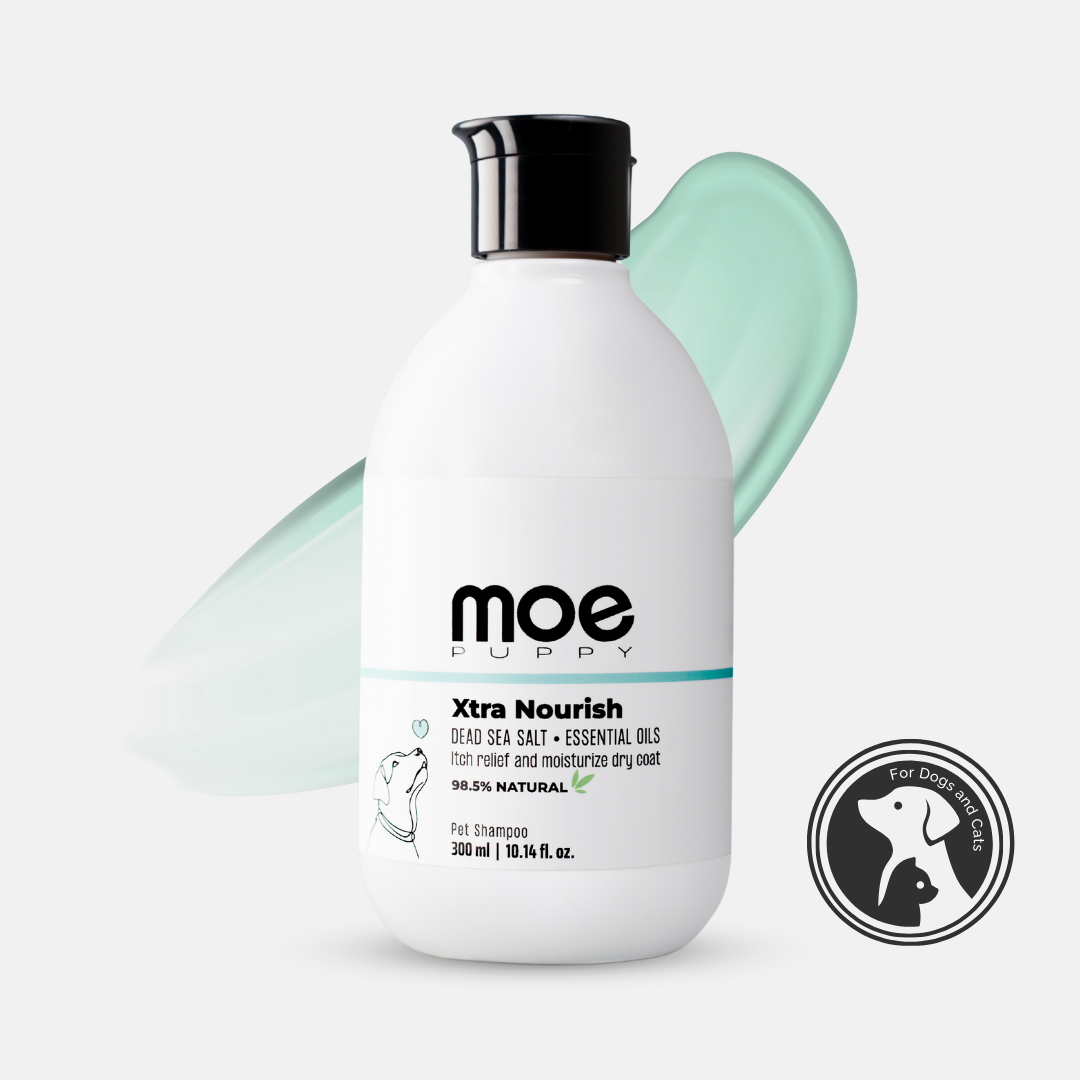
Oatmeal Cat Shampoo: A Gentle Solution for Itchy Skin
Share
If your cat has been scratching like there’s no tomorrow, hiding in corners to groom excessively, or shedding dry flakes like snow—then it’s time to take a serious look at what you’re using for their bath time. Choosing the wrong cat shampoo can do more harm than good, and the solution might just lie in one of the simplest, most natural ingredients: oatmeal.
In this article, we’ll break down why oatmeal works so well, why most commercial shampoos fail, and how dry shampoo for cats becomes essential when frequent baths aren't an option. Let’s dive deep into the science, the solutions, and how you can make grooming a healing experience—not a stressful one—for your cat.
Why Cats Experience Skin Irritation
Before reaching for a bottle of cat shampoo, it’s important to understand the "why" behind your cat’s discomfort. Skin irritation in cats can be caused by:
- Environmental Allergens (pollen, dust, mites)
- Food Allergies
- Parasites (fleas, ticks, mites)
- Poor grooming habits
- Use of harsh grooming products
Their skin barrier is far more delicate than ours, and even minimal exposure to the wrong ingredients can lead to severe reactions.

Why Most Regular Shampoos Fail
Most cat shampoos in the market—especially budget or generic options—include ingredients that can seriously dry out or inflame your cat’s skin. Here are some commonly used ingredients and why they don’t work:
Sulfates (e.g., Sodium Lauryl Sulfate)
These are foaming agents found in many human and pet shampoos. While they help create a rich lather, they also strip away the skin’s natural oils. Cats rely on these oils to maintain a healthy coat and skin barrier. Without them, dryness, flakiness, and itchiness are inevitable.
Artificial Fragrances and Dyes
Sure, a fresh scent might sound nice, but to a cat, it's overwhelming. Worse, artificial additives are common irritants that can lead to allergic reactions, sneezing, watery eyes, or skin inflammation.
Alcohol-Based Ingredients
Alcohols like isopropyl alcohol are drying agents and can leave a cat’s skin dehydrated, increasing their urge to scratch and self-groom excessively.
Human Shampoo or Baby Shampoo
Even mild human shampoos have a different pH than a cat’s skin. Using them disrupts the natural acidity cats require, often leading to long-term irritation.
Why Oatmeal Is a Game-Changer for Cat Shampoo
Oatmeal is a powerhouse ingredient when it comes to gentle skincare—and it's no different for pets. Specifically, colloidal oatmeal (finely ground oats suspended in liquid) is used in high-quality cat shampoo for its unique benefits:
Soothing Relief for Itchy Skin
Oatmeal naturally contains compounds called avenanthramides and beta-glucans, which reduce redness and inflammation. These help soothe itchiness almost immediately upon contact.
Hydration and Moisture Lock-In
Oatmeal acts like a sponge for moisture, drawing water into the skin and creating a protective barrier that keeps it there. This is crucial for cats with dry, flaky skin.
pH Balancing
Cats have a more neutral skin pH compared to humans. Oatmeal helps regulate this balance, preventing the overly acidic or alkaline shifts caused by synthetic shampoos.
Hypoallergenic and Gentle
Unlike harsh chemicals or perfumes, oatmeal is unlikely to cause allergic reactions. It’s the go-to option for cats with sensitive skin or conditions like dermatitis.
The Importance of Limited Bathing for Cats
Let’s face it—cats hate baths. But more importantly, frequent bathing is not ideal for their skin. Their bodies naturally produce oils that protect and nourish the skin and coat. Washing them too often—even with gentle shampoos—can remove these oils and lead to increased dryness and skin issues.
So how do you keep your cat clean in between occasional baths?
Dry Shampoo: A Lifesaver Between Baths
This is where dry shampoo for cats becomes your best friend. These waterless products, often infused with gentle ingredients like oatmeal or aloe vera, allow you to:
- Freshen up your cat’s coat without triggering stress
- Remove surface dirt and excess oils
- Deodorize without artificial fragrances
- Relieve mild itchiness or irritation
Dry shampoo is especially helpful for:
- Senior cats with mobility issues
- Cats recovering from surgery
- Cats that get stressed or aggressive during bathing
It’s a gentle, non-invasive way to maintain hygiene without overbathing.

How to Choose the Right Oatmeal Cat Shampoo
When shopping for the ideal cat shampoo, keep these tips in mind:
- Look for Colloidal Oatmeal: It should be listed as a primary ingredient.
- Avoid Sulfates, Parabens, and Alcohols
- Opt for Fragrance-Free or Naturally Scented (like chamomile or lavender)
- Bonus Ingredients: Aloe vera, shea butter, or coconut oil enhance the moisturizing effects.
- Vet Recommended: Always choose products that are safe for cats and ideally recommended by veterinarians.
How to Use Oatmeal Shampoo Safely
Here’s a quick guide to using it properly:
- Wet your cat’s coat with lukewarm water
- Apply a generous amount of oatmeal shampoo and massage it gently into the skin
- Let it sit for 5 minutes to maximize the soothing effect
- Rinse thoroughly to avoid residue build-up
- Dry gently with a soft towel
Repeat only when necessary—typically every 4–6 weeks unless otherwise advised by a vet.
When to Seek Veterinary Help
Oatmeal shampoo is powerful, but it’s not a cure-all. If your cat is still scratching excessively or showing signs of infection (open sores, constant licking, unusual hair loss), consult your vet. Persistent symptoms could point to:
- Fungal infections
- Food allergies
- Parasites
- Autoimmune disorders
Early intervention can save your cat from discomfort and prevent more serious health issues.
Conclusion
Choosing the right cat shampoo can transform your cat’s grooming experience from stressful to soothing. Most shampoos on the market contain harsh ingredients that do more damage than good—especially for sensitive-skinned felines. Oatmeal stands out as the gentle warrior your cat needs, helping combat itchiness, dryness, and inflammation naturally.
And for the days when a full bath is out of the question, oatmeal-infused dry shampoo for cats bridges the gap with ease and comfort.
As pet parents, we owe it to our furry companions to pick what's best—not just what's available. Give oatmeal cat shampoo a try, and watch your kitty say goodbye to the itch.
FAQs
1. Can I use oatmeal cat shampoo on kittens?
Yes, as long as it's labeled safe for kittens. Always do a patch test first.
2. How often can I use dry shampoo on my cat?
You can use it once a week or as needed, depending on their activity and skin condition.
3. Will oatmeal shampoo help with flea bites?
While it soothes irritated skin, it won’t eliminate fleas. Pair it with a vet-approved flea treatment.
4. Can I use oatmeal shampoo as a regular shampoo for my healthy cat?
Absolutely! It's gentle enough for regular use and helps maintain a soft, healthy coat.
5. Is it okay to use human oatmeal shampoo for my cat?
No. Always choose a formula specifically designed for cats to match their pH levels.

